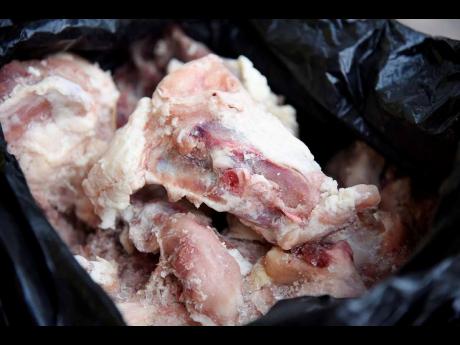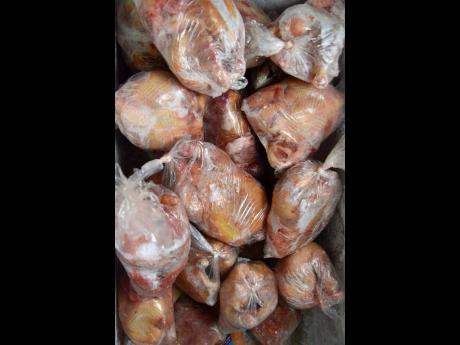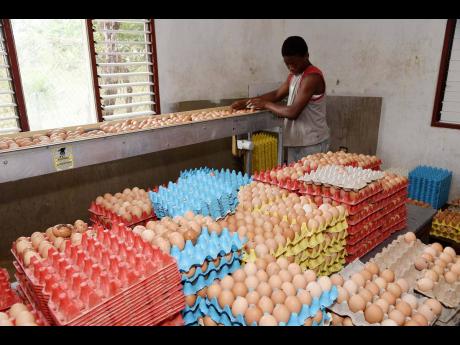J’cans turn to cheaper sources of protein
Eggs, a cheaper source of protein than meat (tinned or fresh), climbed by almost nine per cent by consumer purchases in 2023.
Consumption of eggs increased in Jamaica in 2023 to 254,947,500, up 8.9 per cent year-over-year. In 2022, eggs purchased by consumers totalled 232,345,799, according to the data from the Ministry of Agriculture, Fisheries and Mining.
Eggs can be purchased wholesale at the rate of J$1,200 for 30 eggs, called a ‘flat’.
The price compares to chicken meat, which retails at around $400 per pound, and other meats such as beef, goat and pork, which is priced around the $1,000 mark per pound.
At the end of 2023, consumers told the Financial Gleaner they were paying $1,500 per pound for goat meat, up from $1,000 in 2022. Pricing for both meats and produce were higher than at the start of the year.
Cheaper sources of protein are sought after as food inflation continues to spike.
Farmers, meanwhile, are producing more eggs.
Owen Scarlett, senior director of agro-parks and production zones at the Agro-Investment Corporation, the state agency which facilitates agri-business, says that data from the Ministry of Agriculture, Fisheries and Mining indicates that egg production moved from 166 million in 2019 to approximately 232 million in 2022, representing growth of approximately 39 per cent over the period.
The Statistical Institute of Jamaica indicates that eggs are exported, but 2021 is the only year for which they have data. In that year 7,305 kilogrammes of eggs valued at $2.92 million were exported to Trinidad and Tobago.
Agro-Invest indicates that some egg supplies are also sourced from the United States.
Jamaica imports approximately $5 billion in meats annually, according to the Statistical Institute of Jamaica.
Thomas Tyler, executive co-chairman and co-founder of Caribbean Producers Jamaica Limited (CPJ), which primarily supplies the hotel industry with protein, including seafood, says higher prices for 2023 are due to issues of demand and supply coming out of the COVID-19 pandemic, and increases in the cost of animal and labour.
In relation to the pricing of beef protein, he explained: “During COVID, there were major shortages because cattle could not be slaughtered in the factories. This resulted in increases in price.”
Coming out of COVID without demand but with increased production, the prices came back down. However, due to COVID, the farmers did not put enough cattle into the process needed for slaughtering. It is a 30-month period. As a result, prices have gone back up because there is a shortage of cattle now and, alongside shortages, consumption has been stronger. There will be shortages going into 2024 and 2025.
Jamaica, although it is largely self-sufficient in chicken, has also seen price fluctuations for this protein source due to feed costs and higher overheads in general.
In terms of the entire meat market, Tyler said: “Where [as] pre-COVID the market was more predictable, there is now no traditional cycle on protein.
“Workers who did not want to return to the slaughterhouse post-COVID have had to be paid more to come back, and this has also affected meat pricing, Tyler said.
The Consumer Affairs Commission (CAC) has offered analysis based on packaged and canned foods which make up its basic basket, noting the largest price movements for milk and meats.
Analysis provided for the Financial Gleaner in mid-December noted price changes for various products from January to October 2023. The data collected includes information on the product name, size, and the percentage change in price during the specified period.
Of the items surveyed, the largest percentage price increase (23) was seen for Anchor full cream powdered milk, while imported chicken back had an average price increase of 19 per cent.
Jamaica Gold dark sugar and Worthy Park Estate dark sugar recorded average price increases of 15 per cent and 14 per cent, respectively, while average price increases of 11 per cent and nine per cent were observed for Lasco Step 1 infant formula and Nestlé Lactogen infant formula, respectively.
Brunswick and Grace sardines experienced average price increases of eight per cent and seven per cent, respectively, whereas a five per cent average price increase was noted for hard dough white bread, hard dough wheat bread, and Lasco Readi-Milk skimmed milk powder.
The CAC stated: “The greatest average price reduction (11 per cent) for chicken back was observed over the period June to July, while the highest average price increase (18%) was observed over the period August to September. Bread prices recorded their highest average price increase (5%) during the April to May period.”
Thomas Tyler of CPJ noted: “The only thing that will bring down the cost of goods is less consumption,” adding that for Jamaica’s primary meat source, which is the United States, demand continues unabated.



